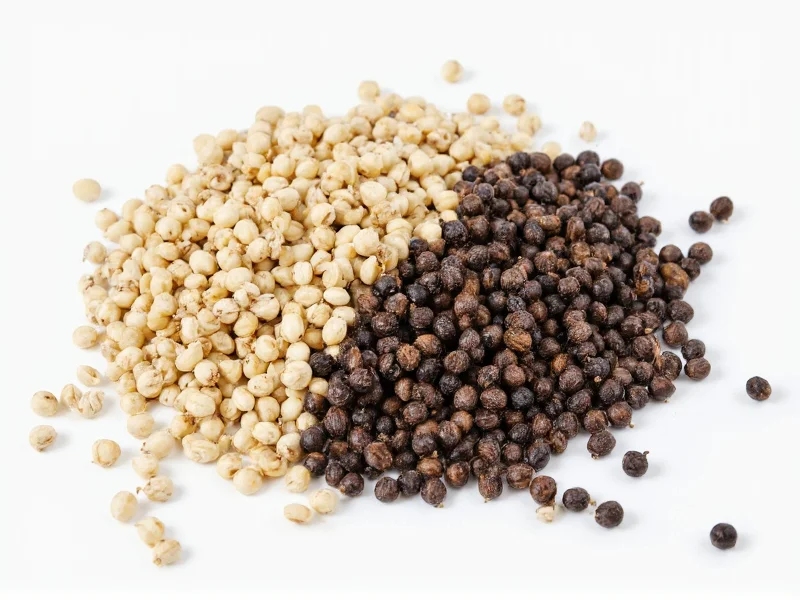Understanding the distinction between white and black pepper helps home cooks and professional chefs make informed seasoning choices. Though derived from the same vine-grown peppercorns, their processing methods create dramatically different flavor profiles and culinary applications. This comprehensive guide explores their origins, chemical composition, and practical uses in modern cooking.
Origins and Production Process
Both white and black pepper originate from Piper nigrum, a flowering vine native to South India. The critical difference lies in harvest timing and processing:
- Black pepper: Unripe green berries are briefly cooked in hot water, then sun-dried for 1-2 weeks. This process triggers enzymatic reactions that darken the outer layer (pericarp) and develop complex flavor compounds.
- White pepper: Fully ripe red berries soak in water for 7-10 days, fermenting the outer layer which is then mechanically removed. The remaining seed undergoes sun-drying, resulting in pale peppercorns.
This difference in processing explains why black pepper contains higher concentrations of piperine (the compound responsible for pepper's heat) and volatile oils that create its characteristic aroma. White pepper's fermentation process produces different flavor compounds, including geosmin, which contributes to its earthier profile.
| Characteristic | Black Pepper | White Pepper |
|---|---|---|
| Harvest Stage | Unripe (green) | Ripe (red) |
| Processing Method | Sun-dried with outer layer intact | Outer layer removed before drying |
| Flavor Profile | Sharp, complex, floral notes | Milder, earthy, slightly fermented |
| Heat Level | Higher (more piperine) | Moderate (less piperine) |
| Common Culinary Uses | General seasoning, meat rubs, visible garnish | Cream sauces, light-colored dishes, Chinese cuisine |
Flavor Chemistry and Sensory Differences
Scientific analysis reveals why these peppers taste distinct despite shared origins. Black pepper contains approximately 5-9% piperine, while white pepper contains 3-7%. This difference affects both heat perception and flavor complexity.
Black pepper's volatile compounds include:
- Limonene (citrus notes)
- Caryophyllene (woody, spicy)
- Pinene (pine-like aroma)
White pepper develops different compounds during fermentation:
- Geosmin (earthy, soil-like)
- Methylisoborneol (musty)
- Various aldehydes from microbial action
These chemical differences explain why professional chefs often select black pepper for most applications but reach for white pepper when appearance matters. The visual impact of black specks in a béchamel or potato salad makes white pepper the preferred choice in these scenarios.
Culinary Applications and Substitution Guidance
Understanding when to use white pepper versus black pepper elevates dish presentation and flavor balance. Consider these practical applications:
Best Uses for Black Pepper
- Steak and meat rubs (creates flavorful crust)
- Visible finishing on dishes like salads or roasted vegetables
- Dark sauces and braises where appearance doesn't matter
- When maximum aromatic complexity is desired
Best Uses for White Pepper
- Creamy sauces (béchamel, alfredo)
- Light-colored soups and purees
- Chinese and Vietnamese cuisine (traditional preference)
- Delicate fish dishes where visual appeal matters
When substituting one for the other, remember that white pepper generally requires 25-30% more by volume to achieve similar heat levels. However, the flavor profiles differ enough that substitutions may alter the dish's character. For example, using black pepper in a classic béchamel would create visual distraction without matching the intended flavor profile.
Nutritional Comparison and Storage Tips
Nutritionally, both peppers offer similar benefits as sources of:
- Manganese (supports bone health)
- Vitamin K (blood clotting)
- Dietary fiber
- Piperine (enhances nutrient absorption)
The minor differences in nutrient concentration stem from the removal of the outer layer in white pepper processing. Black pepper contains slightly higher levels of certain antioxidants due to the preserved pericarp.
For optimal freshness:
- Store both in airtight containers away from light and heat
- Buy whole peppercorns and grind as needed (pre-ground loses potency in 4-6 months)
- Black pepper maintains peak flavor for 1-2 years; white pepper for 6-12 months
Common Misconceptions Addressed
Several myths persist about these peppers. Let's clarify:
- "White pepper is just bleached black pepper" - False. Traditional white pepper uses natural fermentation to remove the outer layer, not chemical bleaching.
- "White pepper is healthier" - Neither has significant health advantages; both contain similar beneficial compounds.
- "Black pepper is always hotter" - While generally true, heat varies by origin and freshness. Some white pepper varieties can match milder black peppers.











 浙公网安备
33010002000092号
浙公网安备
33010002000092号 浙B2-20120091-4
浙B2-20120091-4